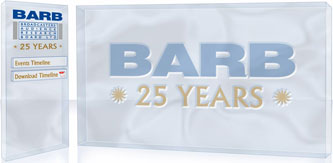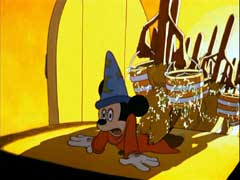Torin Douglas on the digital media explosion at the AUKML conference in Edinburgh
This weekend I was at the 2006 AUKML conference in Edinburgh. Sadly I wasn't able to attend most of Ian Watson's keynote speech, so the first speaker I saw in full was the BBC's Media correspondent, Torin Douglas.
His talk was about 'Digital overload - the media explosion'. It was a trip through the massive way the landscape has changed for media companies, and their librarians, over the last 25 years or so. Although it is a theme I have been aware of for several years, Torin used some fantastic statistics to illustrate the changes, which had me scrabbling for my notebook.
At the outset of his talk, Torin quoted BBC Director-General Mark Thompson's first internal address to staff at the BBC - something I watched over the corporation's ringmain. He cited Thompson's basic assertion that more stuff was happening faster than ever before, so the response had to be stronger than ever before.
You know the list - it hasn't altered much over the years.
Cut bureaucracy and overheads, modernise management, simplify processes.
Use new technology and a more skilled workforce to improve quality and value for money.
Improve working across the BBC and between the BBC and its external partners and stakeholders.
Talking to some people at the BBC you get the sense that they think they've done change, in fact they've had a skinful of it, thank you very much - projects, working parties, initiatives, out-sourcing, new ways of working, you name it.
But you know from the outside - and you may not want to hear this - it feels like the task of really changing the BBC has only begun.
Our world - the world of broadcasting and media - is itself changing with the speed of an express train.
We face amazing new challenges and opportunities.
What they mean is that we're going to have to change the BBC more rapidly and radically over the next three to five years than at any previous point in its history.
So far Torin Douglas is one member of the BBC's journalistic teams who have escaped one of the main effects of that rapid and radical change - job cuts.
One of the revealing statistical tools he used was a 25 year timeline website recently launched by BARB which charts the changes in television ratings figures over that time.

When BARB first started collating TV ratings, it monitored three channels, who all only broadcast in the evening. Now it measures 237 British television channels. The impact that number of available channels has had on viewing figures is to splinter the audience, and as Torin said, there is barely a week goes by without the newspapers reporting that ITV1 / BBC One / EastEnders has had their worst ratings ever.
It was when Torin started reading out some of the names of the programmes and the figures involved, that you began to get some perspective on how much things have changed. In 1982 the biggest TV audience of the year was when the James Bond film 'The Spy Who Loved Me' pulled in 22.9 million viewers. Every single programme in the top ten in 1982 was on ITV, and all of them, including an edition of "Play Your Cards Right" attracted audiences of over 16.85 million.
Fast forward to 2005 and ITV1 and BBC1 shared five each in the top ten - and none of them could outperform Bruce Forsyth in his 1982 card-playing pomp. Coronation Street and EastEnders were first and second with audiences of 14.3 million recorded within four days of each other in February 2005.
Whilst a lot of this was familiar territory for me, it was very interesting to watch the reactions of those around me in the room, who maybe haven't been exposed to the same kind of mavens declaring that 'the future was here yesterday' like I have been. Torin played a TARDISode on his mobile phone, talked about how 70% of British teenagers belong to some kind of online social network, and was open that there are now nearly one hundred thousand people in the UK regularly downloading TV programmes illegally onto their computers, watching series like 'Lost' and 'Desperate Housewives' long before they allowed to be transmitted terrestrially on our side of the Atlantic.
He also admitted that he couldn't get the hang of RSS feeds, so I made a point of grabbing him in the coffee break to recommend he try either Bloglines or Rojo.
He finished his talk with a powerful image. After deluging the audience with a bamboozling list of statistics about the proliferation of media output and content generation from a host of spheres that barely even existed ten years ago, he conjured up the image of Mickey Mouse from Disney's classic Fantasia film. There we were, desperate to stop the media pouring more buckets of content over us, and every time we swiped at them with our axe, media outlets multiplied to hasten the speed with which we are swamped.

One of the reasons for putting this all before a gathering of media librarians is that whilst the rest of us are just trying to avoid drowning, it is media librarians who are expected to analyse, classify, index and archive this ever-increasing sea of content.
Torin should also try Google Reader for RSS: its new interface is *much* nicer.
However, don't just think TV is competing with other TV channels (the 237 you quote is far from the total available to a Sky viewer); TV is competing with more radio stations, with the internet as a whole, with iPods and podcasts and blogs and lots of other non-video things.
It's the inability to see the wider changes in the media, rather than just concentrate on your own part of it, which is separating tomorrow's media giants from tomorrow's hasbeens. The converging media landscape is the *real* future. And wooo, it's scary.
Yes, I haven't had a chance to look at the new Google Reader, but I understand people have been saying very nice things about it.
In fairness to Torin, he did also talk about social networking sites, blogging, YouTube, internet radio, podcasting and music downloads.
He also talked in a very informed way about how the advent of emails and blogging had started a conversation with the people who "consumed" his media output, and it was changing the way he reported things.
I've just rather focussed on the TV stuff here because frankly the thought of 16.8 million people sitting down at one go, with no time-shifting, to watch a Bruce Forsyth quiz show completely boggled my mind. That's more wooo scary than the future if you ask me ;-)